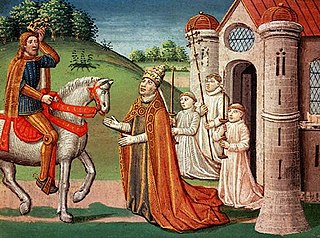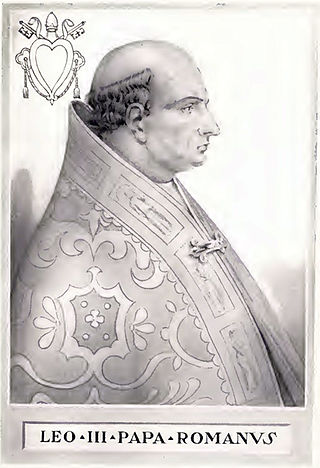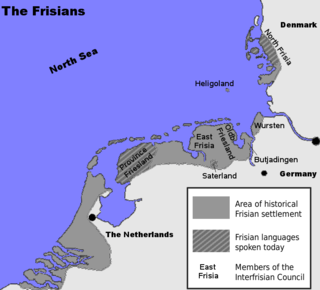The 800s decade ran from January 1, 800, to December 31, 809.
The 790s decade ran from January 1, 790, to December 31, 799.
The 780s decade ran from January 1, 780, to December 31, 789.
The 770s decade ran from January 1, 770, to December 31, 779.
The 760s decade ran from January 1, 760, to December 31, 769.

Year 710 (DCCX) was a common year starting on Wednesday of the Julian calendar. The denomination 710 for this year has been used since the early medieval period, when the Anno Domini calendar era became the prevalent method in Europe for naming years.

Year 772 (DCCLXXII) was a leap year starting on Wednesday of the Julian calendar. The denomination 772 for this year has been used since the early medieval period, when the Anno Domini calendar era became the prevalent method in Europe for naming years.

Year 795 (DCCXCV) was a common year starting on Thursday of the Julian calendar. The denomination 795 for this year has been used since the early medieval period, when the Anno Domini calendar era became the prevalent method in Europe for naming years.

Year 810 (DCCCX) was a common year starting on Tuesday of the Julian calendar.
Year 747 (DCCXLVII) was a common year starting on Sunday of the Julian calendar. The denomination 747 for this year has been used since the early medieval period, when the Anno Domini calendar era became the prevalent method in Europe for naming years.

Year 775 (DCCLXXV) was a common year starting on Sunday of the Julian calendar. The denomination 775 for this year has been used since the early medieval period, when the Anno Domini calendar era became the prevalent method in Europe for naming years.

Year 776 (DCCLXXVI) was a leap year starting on Monday of the Julian calendar. The denomination 776 for this year has been used since the early medieval period, when the Anno Domini calendar era became the prevalent method in Europe for naming years.

Year 778 (DCCLXXVIII) was a common year starting on Thursday of the Julian calendar, the 778th year of the Common Era (CE) and Anno Domini (AD) designations, the 778th year of the 1st millennium, the 78th year of the 8th century, and the 9th year of the 770s decade. The denomination 778 for this year has been used since the early medieval period, when the Anno Domini calendar era became the prevalent method in Europe for naming years.

Year 782 (DCCLXXXII) was a common year starting on Tuesday of the Julian calendar, the 782nd year of the Common Era (CE) and Anno Domini (AD) designations, the 782nd year of the 1st millennium, the 82nd year of the 8th century, and the 3rd year of the 780s decade. The denomination 782 for this year has been used since the early medieval period, when the Anno Domini calendar era became the prevalent method in Europe for naming years.

Year 783 (DCCLXXXIII) was a common year starting on Wednesday of the Julian calendar. The denomination 783 for this year has been used since the early medieval period, when the Anno Domini calendar era became the prevalent method in Europe for naming years.

Year 785 (DCCLXXXV) was a common year starting on Saturday of the Julian calendar. The article denomination 785 for this year has been used since the early medieval period, when the Anno Domini calendar era became the prevalent method in Europe for naming years. It is still used today in this manner.

Year 793 (DCCXCIII) was a common year starting on Tuesday of the Julian calendar. The denomination 793 for this year has been used since the early medieval period, when the Anno Domini calendar era became the prevalent method in Europe for naming years.

Year 794 (DCCXCIV) was a common year starting on Wednesday of the Julian calendar, the 794th year of the Common Era (CE) and Anno Domini (AD) designations, the 794th year of the 1st millennium, the 94th year of the 8th century, and the 5th year of the 790s decade. The denomination 794 for this year has been used since the early medieval period, when the Anno Domini calendar era became the prevalent method in Europe for naming years.

Year 730 (DCCXXX) was a common year starting on Sunday of the Julian calendar. The denomination 730 for this year has been used since the early medieval period, when the Anno Domini calendar era became the prevalent method in Europe for naming years.

The Saxon Wars were the campaigns and insurrections of the thirty-three years from 772, when Charlemagne first entered Saxony with the intent to conquer, to 804, when the last rebellion of tribesmen was defeated. In all, 18 campaigns were fought, primarily in what is now northern Germany. They resulted in the incorporation of Saxony into the Frankish realm and their forcible conversion from Germanic paganism to Christianity.














